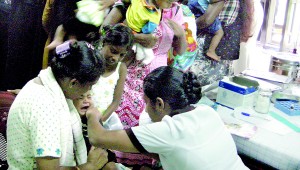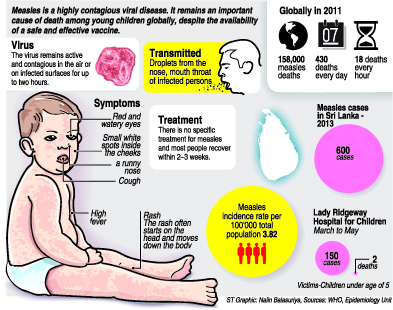Sunday Times 2
Prevent measles, get your infants immunised now
Hard on the heels of a measles outbreak, the Health Ministry launched on Friday an islandwide campaign to administer a booster dose of the measles vaccine for infants between six to 12 months and parents have been requested to get their babies immunised against this contagion.

A little boy yells as he gets the jab at the Fowzie Maternity Home. Pic by Athula Devapriya
According to the Health Ministry’s Epidemiology Unit chief Dr. Paba Palihawadane 600 confirmed cases of measles were reported during the first six months of the year compared to the 803 cases for the whole of last year.
However, other Health Ministry sources said the number could be more than 1000 and that several unconfirmed deaths have been reported.
“The Ministry has distributed 300,000 doses of the vaccine to government medical clinics and private hospitals in the main cities. The majority of the victims are below the age of one. The immunization programme that began on Friday will be continued on July 13, 20 and 27. It is free of charge at state clinics,” Dr. Palihawadane said.According to the World Health Organization (WHO), two doses of the vaccine are recommended to ensure immunity. Fifteen percent of vaccinated children fail to develop immunity from the first dose.
Dr. Palihawadane said children who have fever should not be vaccinated immediately.
Health Services Director General P.G. Mahipala this week announced a measeles outbreak after 17 years adding that the only way to control the outbreak would be through vaccination.
The first sign of measles is usually a high fever, which comes up about 10 to 12 days after exposure to the virus and lasts between four to seven days.
A runny nose, cough, red or watery itchy eyes which are sensitive to light, sore throat, muscle ache and small white spots inside the cheeks can develop in the initial stage.
After several days, a rash erupts, usually on the face and upper neck. The rash spreads, eventually reaching the hands and feet and lasts for about five to six days. On average, the rash occurs 14 days after exposure to the virus (within a range of seven to 18 days).
Infants with compromised or weakened immune systems and especially those who have insufficient vitamin A, are vulanerable to complications associated with the disease, sometimes leading to death.
Serious complications include blindness, encephalitis (an infection that causes brain swelling), severe diarrhoea and related dehydration, ear infections, or severe respiratory infections such as pneumonia.
 Lady Ridgeway Children’s Hospital Director Dr. Ratnasiri Hewage said the isolated wards at the hospital were overcrowded and several patients had been transferred to the Infectious Diseases Hospital (IDH).
Lady Ridgeway Children’s Hospital Director Dr. Ratnasiri Hewage said the isolated wards at the hospital were overcrowded and several patients had been transferred to the Infectious Diseases Hospital (IDH).
The measles virus is spread by coughing and sneezing, close physical contact or direct contact with infected nasal or throat secretions.
“There were more than 150 confirmed cases in the hospital during the past few months, both the isolation wards and medical wards are overcrowded,” he said.
Dr. Hewage said the commonest complication among children infected by the disease was pneumonia and parents should take special care.
“The extra dose is only for infants between 6 to 12 months, but we are getting many inquiries from parents who have older children and have got the first and second MMR (measles, mumps, and rubella) vaccine doses,” said Dr. Omala Wimalaratne, Consultant Virologist and Vaccinologist at the Medical Research Institute (MRI).
She said the viruses were in the environment and that the only way to prevent them spreading is by being vaccinated.
She said there should be a month’s gap between giving the Japanese Encephalitis (JE) vaccine and the measles vaccine.
Follow @timesonlinelk
comments powered by Disqus

